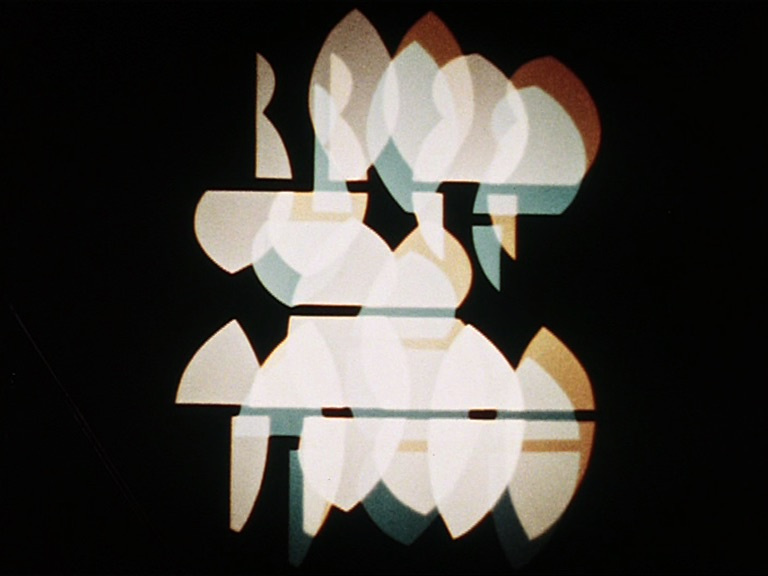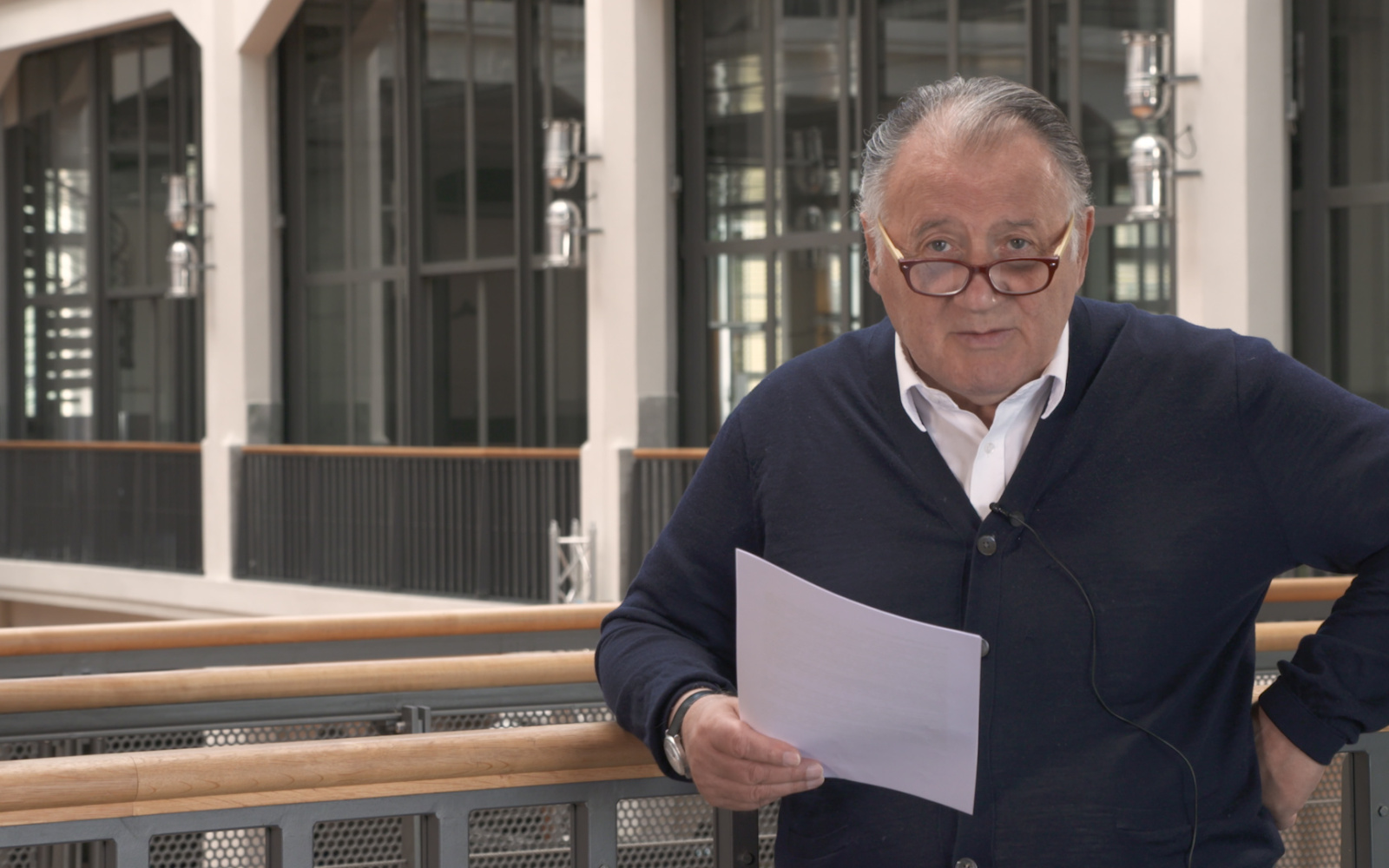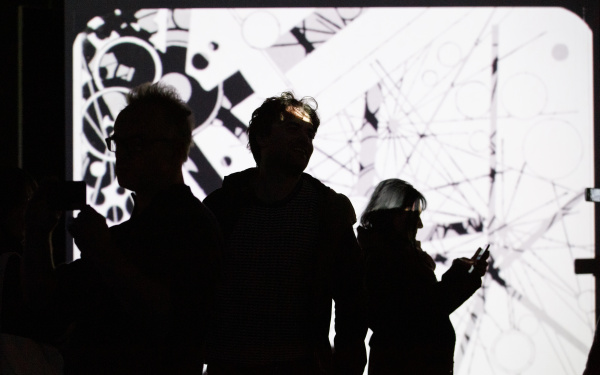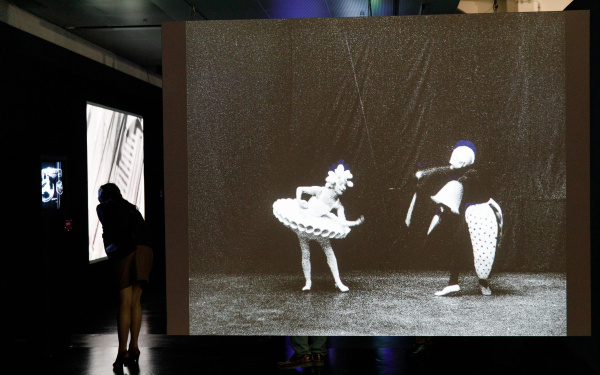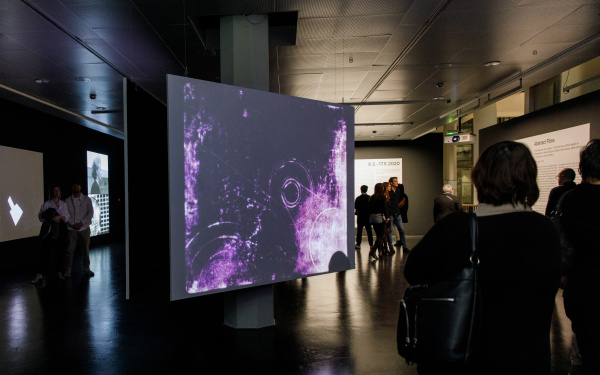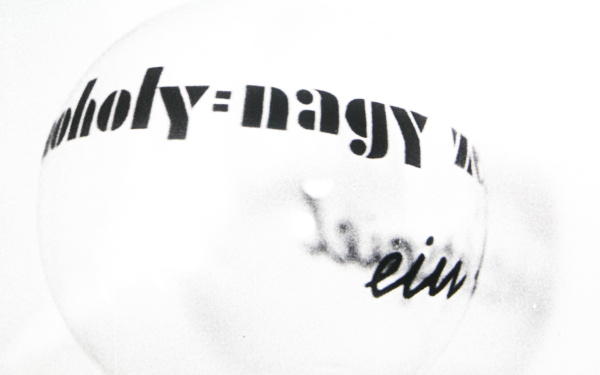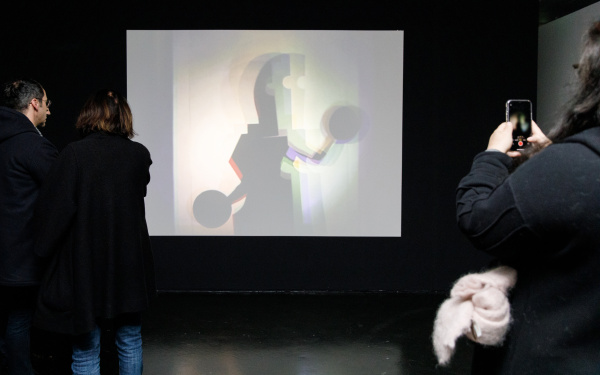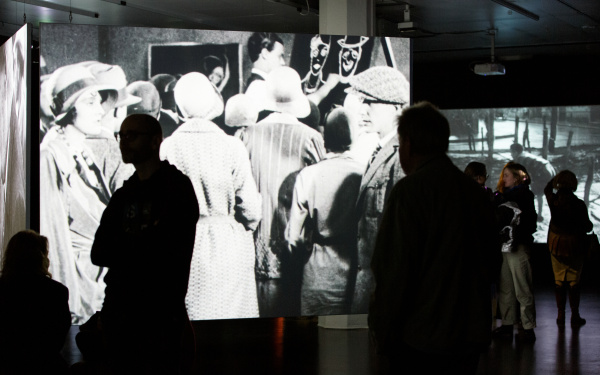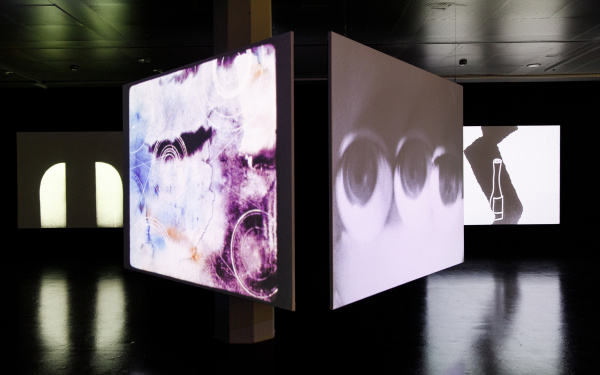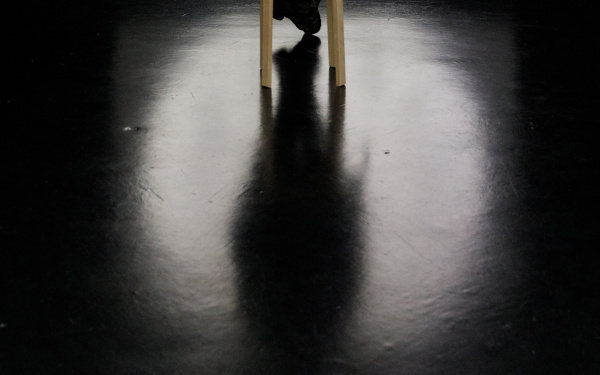- Exhibition
bauhaus.film.expanded
Sat, February 08 – Sun, August 23, 2020
- Location
- Atrium 1+2, 2nd floor
»bauhaus.film.digitally.expanded«, initiated and curated by Teresa Retzer, makes the majority of the exhibition films freely available online and also expands the exhibition through expert discussions that are transmitted via the ZKM livestream. The Bauhaus films can be found below.
The show takes up the idea of a »Totaltheater – total theater,« which Bauhaus director Walter Gropius designed in 1926/1927 for Erwin Piscator: »I have not only envisaged the possibility of film projection upon the whole cyclorama of my three-fold stage by means of movable projectors,« wrote Gropius, »but I can also set the entire audience inside a film, as it were, by projecting on walls and ceilings.« In large format projections more than sixty films by Bauhaus authors will be presented in parallel to make the immersive virtual environment experienceable. Films of various lengths run in loops at forty media stations and continually spawn new interrelationships. Thematically and formally the films fall into four categories, and in the exhibition, they are shown: Abstract Films, Political and Experimental Film Essays, Architectural Films, Extended Forms of Films (light projections, film clips for the theater, film performances, film scores).
Persecution by the Nazis, emigration, and war destroyed parts of the Bauhaus film corpus with the effect that the ongoing development of the modern film in Germany came to a halt. Some Bauhaus authors could only realize the films they had conceived in their years at the Bauhaus after the war – partly because their projects needed color film and that had not yet been introduced. The light projections, dance and object theater, which were always presented live in the 1920s, can be viewed on recordings from the post-war period.
The show highlights particularly the important role of the seven Bauhaus women who made films. Two of them coauthored seminal German avant-garde films but up to now they have remained uncredited. In symbiotic living and working communities these women – amongst them Ellen Auerbach, Ella Bergmann-Michel, Ré Soupault (geb. Erna Niemeyer) und Lore Leudesdorff – brought the new formal language of the Bauhaus to the classic works of Absolute film.
Bauhaus professor László Moholy-Nagy advocated establishing a »central experimental film section« at the school. As one of the most important image theorists of the twentieth century and one of the leading innovators at the Bauhaus he placed film and photography at the center of his thinking about »Neues Sehen – New Vision.« However, he was not successful in securing the necessary funding from industry for this venture. In spite of this, new research has shown that more than 28 Bauhaus authors did actually worked on film and light projections.
Films in the online exhibition »bauhaus.film.digitally.expanded«
-
Extended Forms of Films
Bernhard Redetzki, »Motiv am Meer« [Motif at the sea], DE 1958–1960
35mm, b/w, silent, 02:45 [12:15] by 24 frames/sec
filmed of a 35mm positive
© Axel MalzacherHans Cürlis, »Schaffende Hände: Kandinsky« [Creating hands: Kandinsky], DE 1926
35mm, b/w, silent, 02:38 [08:16] by 24 frames/sec
Digital copy of 35mm positive
Courtesy Peter CürlisUtz Brocksieper, »In the Studio: Heinrich Brocksieper«, DE 1966
35mm, b/w, silent, 4:22 by 24 frames/sec
Digital copy of a 8mm Positive: ZKM | Karlsruhe
© Utz BrocksieperLászló Moholy-Nagy, »ABC in Sound«, DE 1933
35mm, b/w, sound, 01:55 by 24 frames/sec
Digital copy of 35mm film: British Film Institute
© British Film InstituteKurt Schwerdtfeger, »Reflecting Color-Light Play«, DE 1922/1923/1967
16mm, color, silent, 17:05 by 24 frames/sec
Digital copy of a 16mm positive
© Paula SchwerdtfegerLászló Moholy-Nagy, »Ein Lichtspiel schwarz-weiß-grau«, DE 1930
35mm, b/w, silent, 08:16 by 16 frames/sec
Digital copy of 35mm film: Light Cone
© Light Cone & the Moholy-Nagy FoundationLudwig Hirschfeld-Mack, »Farbenlichtspiele: S-Tanz (Soviet-Tanz)«, DE 1923/AT 2000
Reconstruction by Corinne Schweizer and Peter Böhm, DVD PAL, color, music: Ludwig Hirschfeld-Mack, arranged by Peter Böhm, 04:57 at 25 frames/sec
© Corinne Schweizer, Peter BoehmLudwig Hirschfeld-Mack, »Kreuzspiel«, DE 1923/1964–1967
16mm, b/w, silent, 05:47 [09:15] by 24 frames/sec
Digital copy of a 16mm positive
© Kaj DeluganKurt Schwerdtfeger, »Reflecting Color-Light Play [documentary film]«, DE 1922/1923/1967
16mm, color, silent, 04:52 by 24 frames/sec
Digital copy of a 16mm positive
© Paula SchwerdtfegerOskar Schlemmer, »Oscar Schlemmer Stage Ballet«, DE 1926
35mm, b/w, silent, 01:37 by 16 frames/sec
Digital copy of a 35mm positive: Das Bundesarchiv-Filmarchiv / ZKM | Karlsruhe -
Political and Experimental Film Essays
Horacio Coppola, »Sueño« [Dream], FR 1933
16mm, b/w, silent, 02:15 by 25 frames/sec
DVD PAL filmed of a 16mm positiveHoracio Coppola, Grete Stern, Marc Chagall, Jean Miro, »Les Quais de la Seine« [Quays of the Seine], FR 1934
16mm, b/w, silent, 03:33 by 25 frames/sec
DVD PAL filmed of a 16mm PositiveHoracio Coppola, »A Sunday in Hampstead Heath«, GB 1935
16mm, b/w, silent, 08:51 by 25 frames/sec
DVD PAL fimed of a 16mm positiveLászló Moholy-Nagy, »Impressions of the Old Harbor of Marseilles (Vieux Port)«, FR 1929/1932
35mm, b/w, silent, 13:46 by 16 frames/sec
Digital copy of 35mm film: Light Cone
© Light Cone & the Moholy-Nagy FoundationHans Richter, Werner Graeff, »Everything turns, Everything revolves«, DE 1929
35mm, b/w, music: Walter Gronostay, 08:21 by 24 frames/sec
Digital copy of a 16mm positive
© Marion von HofackerEllen Auerbach, »A Cheerful Day in Rügen«, DE 1933
16mm, b/w, silent, 02:50 by 16 frames/sec
Digital copy of a 16mm positive
© VG-BILDEllen Auerbach, »Gretchen hat Ausgang«, 1933
16mm, b/w, silent, 06:35 by 16 frame/sec
Digital copy of a 16mm positive
© VG-BILDEllen Auerbach, »Bertold Brecht in exile in London«, GB 1936
16mm, b/w, silent, 00:57 by 16 frames/sec
Digital copy of a 16mm positive
© VG-BILDLászló Moholy-Nagy, »Berlin Still Life«, DE 1926
35mm, b/w, silent, 12:47 by 16 frames/sec
Digital copy of 35mm film: Light Cone
© Light Cone & the Moholy-Nagy FoundationLászló Moholy-Nagy, »Großstadt-Zigeuner« [Gypsies], DE 1932
35mm, b/w, silent, 18:04 by 16 frames/sec
Digital copy of 35mm film: Light Cone
© Light Cone & the Moholy-Nagy FoundationPeter Pewas, »Alexanderplatz Unawares«, 1932–1934
35mm, s/w, silent, 09:23 by 16 frames/sec
Digital copy of a 35mm Negative
© Stiftung Deutsche KinemathekEllen Auerbach, »The Big Travel«, DE 1933/1934
16mm, b/w, silent, 03:34 by 16 frame/sec
Digital copy of a 16mm positive
© VG-BILDEllen Auerbach, »Tel Aviv«, PS 1933/1934
16mm, b/w, silent, 10:35 by 16 frame/sec
Digital copy of a 16mm Positive
© VG-BILDElla Bergmann-Michel, »Election 1932 (Last Election)«, DE 1932/1933
35mm, b/w, silent, 09:09 by 16 frames/sec
Digital copy of a 35mm negative: DFF - Deutsches Filminstitut & Filmmuseum Frankfurt am Main
© Sünke MichelElla Bergmann-Michel, »Traveling Hawkers in Frankfurt am Main«, DE 1932
35mm / 16mm, b/w, silent, 21:15 by 16 frames/sec
Combinational digital copy of five 35mm negatives and a 16mm positive: DFF - Deutsches Filminstitut & Filmmuseum Frankfurt am Main
© Sünke Michel -
Architectural Films
Richard Paulick, »How Can We Live Healthily and Economically? Part 6: Bauhaus Dessau and its new Architecture«, DE 1926–1928
35mm, b/w, silent, 11:45 by 16 frames/sec
Digital copy of a 35mm positive: Bauhaus-Archiv Berlin
© Bauhaus-Archiv BerlinLászló Moholy-Nagy, »Architect’s Congress«, CH/GB 1933/1934
35mm, b/w, silent, 17:10 [44:00] by 16 frames/sec
Digital copy of 35mm film: Light Cone
© Light Cone & the Moholy-Nagy FoundationLászló Moholy-Nagy, Curt Schumann, »The Test of Fire«, DE 1935
35mm, color, music, 01:57 by 25 frame/sec
DVD Pal of a 35mm Positive
© Murnau StiftungPeter Pewas, »Jena Glass Ad«, DE 1934
35mm, b/w, music, 00:32 by 25 frames/sec
DVD PAL of a 35mm positive
© Stiftung Deutsche KinemathekLászló Moholy-Nagy, Sibyl Moholy-Nagy (née Pietzsch), György Kepes
»Feeding the Infant (Jena Glass)«, DE 1934
35mm, b/w, silent, 11:17 by 25 frames/sec
DVD PAL copy of a 35mm positive
© SchottLászló Moholy-Nagy, Sibyl Moholy-Nagy (née Pietzsch), György Kepes
»The Gourmet«, DE 1934
35mm, b/w, music, 01:43 by 25 frames/sec
DVD PAL copy of a 35mm positive
© SchottLászló Moholy-Nagy,Sibyl Moholy-Nagy (née Pietzsch), György Kepes
»A Lunch in a Jena Glass«, DE 1934
35mm, music, 06:51 by 25 frame/seconds
DVD PAL of a 35mm positive
© SchottHoracio Coppola, »Ási nació el Obelisco« [The Obselisc was Born], ARG 1936
16mm, b/w, silent, 06:52 by 25 frames/sec
DVD PAL filmed of a 16mm PositiveElla Bergmann-Michel, »Where do the Elderly live?«, DE 1931
35mm, b/w, silent, 14:42 by 14 frames/sec
Combination of digital copies of two 35mm positives: DFF - Deutsches Filminstitut & Filmmuseum Frankfurt am Main
© Sünke MichelRichard Paulick, »How Can We Live Healthily and Economically? Part 4: New Living (Haus Gropius)«, DE 1926–1928
35mm, b/w, silent, 13:59 by 16 frames/sec
Digital copy of a 35mm positive: Bauhaus-Archiv Berlin
© Bauhaus-Archiv Berlin -
Abstract Films
Heinrich Brocksieper, »Flächen Perpelleristisch«, DE 1927–1930
Film, b/w, silent, 02:14 by 25 frames/sec
Beta SP
© Utz BrocksieperHeinrich Brocksieper, »Duck«, DE 1927–1930
35mm, b/w, silent, 00:45 by 25 frames/sec
Digital copy of 35mm film: ZKM | Karlsruhe, reconstructed on Beta SP
© Utz BrocksieperHeinrich Brocksieper, »Näherin« [Female Sewer], DE 1927–1930
35mm, b/w, silent, 00:49 by 25 frames/sec
Digital copy of 35mm film: ZKM | Karlsruhe, reconstructed on Beta SP
© Utz BrocksieperAlfred Ehrhardt, »Dance of the Shells«, DE 1956
35mm, b/w, Ton, 09:36 by 24 frames/sec
Digital copy of 35mm negative: Alfred Ehrhardt Stiftung
© Alfred Ehrhardt StiftungAlfred Ehrhardt, »Corals, Sculptures of the Seas«, DE 1964
35mm, b/w, silent, music: Oskar Sala, 11:30 of 24 frame/sec
Digital copy of a 35mm negative
© Alfred Ehrhardt StiftungHans Richter, Ré Soupault, »Filmstudie« [Film Studies], DE 1927/1928
35mm, b/w, silent, 04:22 by 22 frames/sec
Digitized of a 35mm negative-back-up copy: Stiftung Deutsche Kinemathek
Stiftung Deutsche Kinemathek
© Marion von HofackerViking Eggeling, »Symphonie Diagonale«, DE 1924/1925
35mm, b/w, silent, 07:50 by 16 frames/sec
Digitized of a 35mm negative-back-up copy: Svenska Filminstitutet
digitized by: ZKM | Karlsruhe with funding from The German Federal Film Board
Courtesy of The Swedish Film InstituteKurt Kranz, »Schwarz : Weiß/Weiß : Schwarz«, [Black : White:White : Black], DE 1927/1972
35mm, b/w, silent, 02:05 by 24 frames/sec
Digital copy of a 16mm positive: ZKM | Karlsruhe
© Ingrid KranzKurt Kranz, »Twenty Pictures from the Life of a Composition«, DE 1927/1928/1972
35mm, b/w, silent, 02:11 by 24 frames/sec
Digital copy of a 16mm positive: ZKM | Karlsruhe
© Ingrid KranzKurt Kranz, »Color Film called Leporello«, DE 1927/1972
35mm, b/w, silent, 05:25 by 24 frames/sec
Digital copy of a 16mm positive: ZKM | Karlsruhe
© Ingrid KranzKurt Kranz, »The Heroic Arrow«, DE 1927/1972
35mm, b/w, silent, 05:25 by 24 frames/sec
Digital copy of a 16mm positive: ZKM | Karlsruhe
© Ingrid KranzAlfred Ehrhardt, »Play of Spirals. From the Architecture of Sea Snails«, DE 1951
35mm, b/w, music: J. S. Bach, 15:27 by 24 frames/sec
Digital copy of a 35mm Negative
© Alfred Ehrhardt StiftungWerner Graeff, »Composition I/1922«, DE 1922/1977
16mm, b/w, silent, 01:45 by 24 frames/sec
Digital copy of 16mm positive: Stiftung Deutsche Kinemathek
© Stiftung Deutsche KinemathekWerner Graeff, »Composition II/1922«, DE 1922/1959
16mm, b/w, silent, 01:30 by 24 frames/sec
digital copy of 16mm positive: Stiftung Deutsche Kinemathek
© Stiftung Deutsche KinemathekHans Richter, »Haunted Morning«, DE 1928
35mm, color, silent, 06:39 by 22 frames/sec
digital copy of 35mm back-up copy: Stiftung Deutsche Kinemathek
© Marion von HofackerJulius Pinschewer, Walter Ruttmann, Lore Leudesdorff, »Der Aufstieg« [The Climbing], DE 1926
35mm, color, sound, music, 02:01 by 16 frames/sec
Digital copy of a 35mm positive
© Stiftung Deutsche Kinemathek
© Martin LoiberdingerJulius Pinschewer, Walter Ruttmann, Lore Leudesdorff, »Play of the Waves«, DE 1925
35mm, color, silent, 01:46 by 16 frames/sec
Digital copy of 35mm positive: Stiftung Deutsche Kinemathek
© Stiftung Deutsche KinemathekJulius Pinschewer, Walter Ruttmann, Lore Leudesdorff, »The Paradise Found Again«, DE 1925
35mm, b/w, silent, 04:42 by 16 frames/sec
Digital copy of a 35mm positive
© Stiftung Deutsche KinemathekWalter Ruttmann, Lore Leudesdorff, »Opus III«, DE 1924/1925
35mm, colour (originally tinted), music: Hanns Eisler, 03:21 by 16 frames/sec
Digitized of various 35mm positives: Filmmuseum München
© Filmmuseum MünchenWalter Ruttmann, Lore Leudesdorff, »Opus IV«, DE 1924/1925
35mm, colour (originally tinted), silent, 03:56 by 16 frames/sec
digitized of various 35mm positives: Filmmuseum München
© Filmmuseum München
Peter Weibel on the digital exhibition »bauhaus.film.digitally.expanded«
»bauhaus.film.expanded« becomes »bauhaus.film.digitally.expanded«!
Films in the online exhibition »bauhaus.film.digitally.expanded«
Unfortunately, for legal reasons not all the films in the »bauhaus.film.expanded« exhibition can be made available online. Thanks to the generosity of some of the lenders, the majority of the films will be available online for the duration of the exhibition until 23 August 2020.
The videos and content shown in the context of the digital events of the ZKM are protected by copyright and may only be watched by the user on livestream. A partial or complete and permanent download is prohibited and constitutes an infringement of copyright.
Imprint
- Curator
- Curator
- Curator
